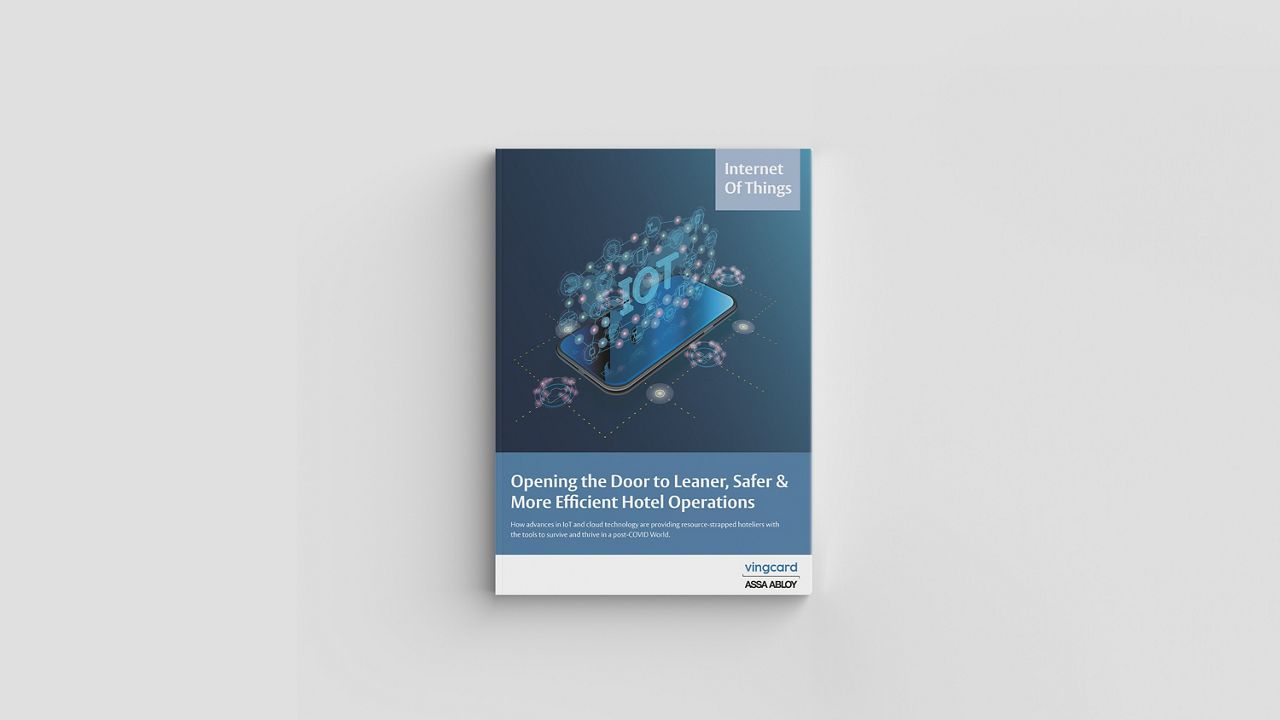
3 Benefits of IoT Technology in Hospitality


In today’s digital world, connectivity and personalization are vital to modern consumers. With the Internet of Things (IoT) allowing for real-time connections between devices and people, adapting smart, interconnected technology is more important than ever for hoteliers striving to meet guest needs.
This is a well-recognized need within the industry. In fact, 70 percent of hospitality executives report that they have active IoT projects, well above the average 48 percent of executives in other industries. In the wake of the pandemic, which fueled a swift industry-wide adaption of new technology, the advantages of IoT are more pronounced than ever before. Read on to learn about three key benefits that IoT can provide to hoteliers, and how it can both enhance the guest experience and improve operational efficiency.
1. Guest Convenience
Adopting IoT technology allows hoteliers to offer new amenities and services aimed at improving efficiency, while also offering a convenient digital experience that aligns with modern guest expectations.
Because nearly 42% of global travelers use their smartphones throughout their trip, equipping properties with Smart technology can help hoteliers cater to the needs of their mobile-first guests. Contactless check-in services, for example, allow guests to access their rooms remotely from their mobile phones, skipping time-consuming front-desk lines. Not only can this benefit hoteliers by allowing frontline staff to focus on other tasks, but when a digital keycard is integrated into a hotel’s mobile app, it can promote guest loyalty and bolster targeted advertising opportunities by incentivizing more guest downloads.
In-room IoT technology also offers a more comfortable and customized stay. Contactless controls enable guests to manage hotel room functions like adjusting thermostat and lighting, connecting with hotel services and accessing vital property and location information with a simple touch. Crucially, this technology allows hoteliers to collect guest data and better understand unique guest interests. With over 70 percent of guests reporting more positive experiences when their stays are personalized, this technology allows hoteliers to remember guest preferences and enables them to customize their guests’ future reservations from it.
2. Sustainability
A global survey in 2020 revealed that Gen-Z and Millennial travelers are more concerned with choosing an environmentally-friendly hotel stay than their older counterparts. As younger travelers begin to dominate the consumer landscape, hoteliers are turning to IoT solutions to help save energy and promote green initiatives.
Hoteliers can implement occupancy sensors, which trigger energy-saving measures such as adjusting temperatures and turning off lights when a guest leaves the room or checks out of the hotel. To maximize a property’s ability to save energy without risking guest comfort, these systems can integrate with a property’s access management to automatically adjust room temperatures when a guest checks into the property.
Hotels can deploy smart monitoring devices, allowing operators to detect issues potential water leaks, poor air quality or malfunctioning HVAC systems and proactively implement solutions, reducing wasted energy. In addition to this, predictive maintenance solutions can help properties avoid equipment breakdowns, while contactless guestroom controls and keyless entry can eliminate paper and plastic usage across the property.
3. Safety & Security
In the last two years, contactless technology has been top-of-mind for operators, and IoT-enabled solutions such as keyless entry and online check-in have played a vital role in eliminating common touchpoints. The adaption of this technology, which reduces the risk of germs, promotes safety and addresses common guest concerns emerging alongside the return of travel. Keyless entry also offers an additional benefit by eliminating the risk of stolen guest keycards, while emerging asset tracking technology can mitigate theft risk by monitoring guest luggage and valuable possessions.
As the industry continues to overcome the challenges introduced by the pandemic, hoteliers are once again focused on addressing the staff safety concerns that have long been present in the industry. Prior to 2020, the assault and harassment of housekeeping and room service workers was a pivotal focal point, sparking the introduction of hotel safety bills across the United States and requiring the adaption of safety devices for hotel employees.
Equipped with emerging innovative IoT technology, hoteliers can now improve emergency response times and exceed property safety regulations. Using cloud-enabled safety devices that can communicate through Bluetooth-based gateways, hotel operators can instantly pinpoint the exact location of a staff alert, which is automatically sent to the appropriate response team. In the event of a security breach, door locks and emergency lighting can also be activated, ensuring both guest and staff safety alike. Providing additional safety to hotel guests, door lock sensors can alert hotel management when a guest door is left open and assign staff to investigate.
As new technology continues to emerge, the potential of IoT and the benefits it provides are limitless. With the ability to profoundly alter how hoteliers operate, this technology has the undeniable potential to completely transform the hospitality industry by optimizing processes, reducing energy waste and providing guests with an exceptionally personalized and seamless experience.
Subscribe to our Newsletter
Fill out the form below to subscribe to our newsletter. By doing so, you'll not only be the first to discover what's next on our blog but also join a community passionate about the innovation and tradition driving the hospitality realm forward.
